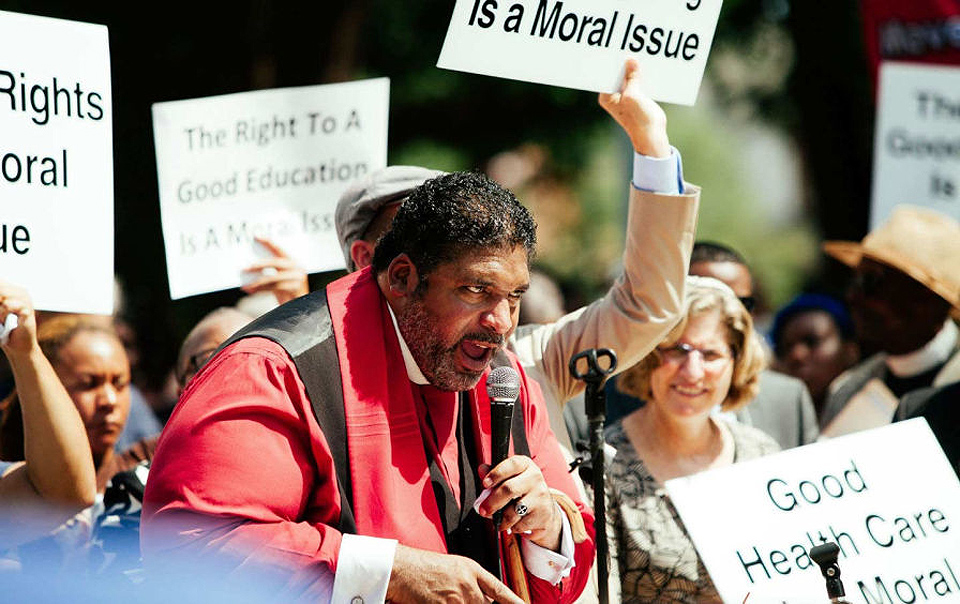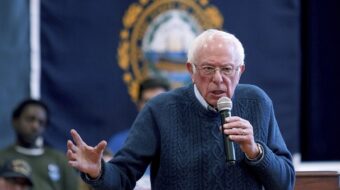
HOUSTON — Never let it be said the Rev. William Barber isn’t one of the most powerful speakers in history.
 Barber, founder and leader of North Carolina’s Moral Mondays movement, which has spread across the South from its origins in the Tar Heel State, roused the crowd at the AFL-CIO’s Martin Luther King conference here on Jan. 13 with a stem-winding sermon that mixed calls to action, demands for justice and denunciations of racism in society and racists in public office.
Barber, founder and leader of North Carolina’s Moral Mondays movement, which has spread across the South from its origins in the Tar Heel State, roused the crowd at the AFL-CIO’s Martin Luther King conference here on Jan. 13 with a stem-winding sermon that mixed calls to action, demands for justice and denunciations of racism in society and racists in public office.
And he wound up by announcing that the New Poor People’s March, scheduled for June 23, would be preceded by 40 days of sit-ins, civil disobedience and campaigns not just in the nation’s capital but in statehouses from coast to coast. King led the first such crusade 50 years ago, until he was murdered.
All the marches, sit-ins and rallies are in King’s tradition to try to rescue a society “that is destroying its moral soul,” Barber declared. Minutes later, he asked the 1,000 attendees to go home and demand their unions – and their union leaders – join in. He got, putting it mildly, an enthusiastic reception.
King, Barber noted, “was not popular when he made those same demands” against an economy that did not work for workers, against war and against systemic racism. “We don’t need commemorations” of the slain civil rights leader, Barber said, but “re-considerations” adopting the causes he fought for.
Barber was the top invited speaker at the conference, which the federation hosts yearly to commemorate King, the civil rights leader assassinated by white racist James Earl Ray in 1968 while King was campaigning for economic justice and the right to unionize with AFSCME for sanitation workers in Memphis, Tenn.
Delegates and other speakers, including AFL-CIO President Richard Trumka, spent the weekend uniting worker rights, civil rights, voting rights and economic rights, just as Dr. King did – and Barber added those causes are also unified by their enemies in politics and corporate suites.
But it’s not just President Donald Trump who’s a problem, Barber warned. It’s the same economic interests King battled. And Democrats who “think they can fight” a “sick neurotic America” with neo-conservatism, so-called “free trade” treaties and ignoring worker rights are just as much to blame, he declared.
So were those unionists who voted for Trump, he said. Exit polls in the key swing states around the Great Lakes – Michigan, Pennsylvania, Ohio and Wisconsin – showed half of unionists and union family members backed the real estate mogul, who upended Democratic nominee Hillary Clinton.
So, for King, were the “72 percent” of African-American leaders who “shunned” King’s anti-war stand and his campaign for “redistribution of wealth.” Said Barber: “They were often cheerleaders and bootlickers for big-money interests” – the same interests running capitalism today, he added.
“The same people who are attacking labor rights are attacking voting rights. The same people who are attacking voting rights are attacking health care. The same people who are attacking health care are attacking the environment,” he declared in one of many passages with the repetitions often heard in churches. If we can’t unite against them, something is wrong with us.”
To jump start that unity, beginning on Mother’s Day, the campaign “will have clergy in full vestments uniting with poor people and going to the offices of the Ryans and the McConnells” – the Republican U.S. House Speaker and Senate Majority Leader – to peacefully sit in. But it won’t just be in D.C.
“Can you imagine more than 150 people leading into the offices” of top lawmakers “in – wait a minute – Michigan, in Mississippi, in South Carolina, in Florida? They’re filling up the capitols and they ain’t goin’ nowhere.”
But it’s not just the politicians who are oppressing the poor, Barber declared. It’s the corporate system and its systemic racism. “Systemic racism is giving them” – the rich and the elite – “economic power” and political clout “while leaving you out,” he told the crowd.
“Blocking the living wage is racism,” Barber said of the major union-backed “$15 and a union” campaign “because 54 percent of black people don’t make it,” meaning that $15 figure.
“Undermining labor rights is racism. Lying about voter fraud rather than suing against voter suppression is racism,” said Barber, whose Moral Mondays’ six-year North Carolina campaign has succeeded in court in overturning such suppression in his home state.
“Standing Rock is racism,” Barber said of a GOP-approved oil pipeline that goes through South Dakotan lands sacred to Native Americans while endangering their clean water source, the Missouri River. Unions split on Standing Rock, with militant National Nurses United opposing it and building trades for it.
“What happens in Puerto Rico is racism,” where half the commonwealth’s 3.5 million residents, all Latinos and all U.S. citizens, still don’t have water and power four months after Hurricane Maria flattened the Caribbean island, Barber said.
“And sending 200,000 Salvadorans and thousands of Haitians back home” to disaster-ravaged nations that can’t handle the tide, as GOP President Donald Trump plans to do, “is racism.” Trump’s doing that, over protests from the AFL-CIO, six unions and immigrant and refugee rights groups, by ending the Temporary Protected Status program that kept the refugees here for years.
“Taking away the Affordable Care Act is racism,” Barber said of Republican efforts to repeal the Affordable Care Act, thus depriving 13 million people of health care coverage, “many of whom have never had it before.” And calling the ACA “Obamacare,” as Republicans do while trying to trash it “is racism” because it insults prior African-American President Barack Obama, who pushed the law through a balky U.S. Congress and over unanimous GOP hatred.
Trump’s “words are bad” and racist, Barber said, referring to the president’s characterization of African nations as “shitholes” and asking “Why do we need more Haitians?” rather than immigrants from all-white Norway. “His policies are racism.”
“But the real problem is not Trump, or Caesar, or pharaoh” who enslaved the Jews in Egypt “or Nebuchadnezzar,” the Assyrian despot who conquered Jerusalem. “America has never repented of her original sin” of racist slavery, Barber said. “And the moment we move forward, there’s a backlash.”
King forecast that current threat in 1965, Barber said, when King said “the aristocracy segregated” white and black workers “so they could not be together” against poverty and for the right to vote and to control their own destiny.
That’s the labor movement’s cause, Barber declared: “Campaigning against the sickness of everything.”












Comments